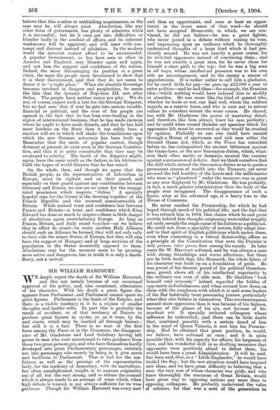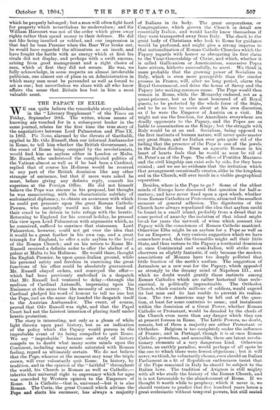W E deeply regret the death of Sir William Harcourt, and
this not merely because of our occasional approval of his policy, and, also occasional, admiration of his character. With his death a great figure dis- appears from Parliament, and Parliament cannot spare its great figures. Parliament is the brain of the Empire, and there is a visible tendency in it to a regime of smaller thoughts and feebler wills. In part this is probably the result of accident, or of that tendency of Nature to produce great figures in cycles, or, as it were, by fits and starts, which may be marked all through history ; but still it is a fact. There is no man of the first force among the Peers or in the Commons, the disappear- ance of Mr. Gladstone and Lord Salisbury having left power to men who were accustomed to take guidance from those two great personages, and who have themselves hardly developed into great Parliamentary personages, certainly not into personages who merely by being in it give nerve and backbone to Parliament. That is bad for the use- fulness as well as the prestige of the representative body, for the tendency of democracy, with its marvellous, but often unenlightened, weight, is to squeeze originality out of all but the very strong, and so reduce the counsel which it always needs to an average of sense which, when high debate is wanted, is not always sufficient for its wise guidance. Though Sir William Harcourt was every now and then an opportunist, and ones at least an oppor- tunist in the worst sense of that word—he should not have accepted Home-rule, in which, we are con- vinced, he did not believe—he was a great fighter, who never joined in a debate without raising its tone, and impressing upon an audience which he thoroughly- understood thoughts of a large kind which it had pre- viously missed. He was not exactly a great orator, for he irritated opponents instead of convincing them; and he was not exactly a great man, for he never chose for himself a clear path to the top ; but he was a big man in all ways, whose intellectual presence was to his own side an encouragement, and to the enemy a source of apprehension. It is rather unfair to call him a gladiator, for he cared little for pay—he gave up £12,000 a year to enter politics—and lie had ideas—for example, the Erastian idea—which nothing would have induced him to modify or abandon. He was more like the kind of general who, whether he leads or not, can lead well, whom the soldiers regards as a reserve force, and who is sure not to retreat unless he considers retreat the wiser course. He shared, too, with Mr. Gladstone the power of mastering detail, and therefore, like him, always knew his case perfectly ; and he could when roused thunder out speeches which his opponents felt must be answered or they would be crushed by opinion. Probably no one else could have carried through a House of sportsmen and rich men either the Ground Game Act, which, as the Times has remarked before us, has extinguished the ancient bitterness against the Game-laws, or the new Succession-duties, which, what, ever their other merits or demerits, secured the country against a succession of deficits. And we think ourselves that the skill which revised the Succession-duties so as to guide a permanent stream of wealth into the Treasury, yet never aroused the full hostility of the Lords and the millionaires who were so "plundered "under the measure, was as great as any ever displayed by Mr. Gladstone. He was probably, in fact, a much greater administrator than the body of the people ever recognised. The disappearance of such a figure, even at his advanced age, is a heavy loss to the House of Commons.
He never reached the Premiership, for which he had hoped through much of his political life; and the fact that it was refused him in 1894, that claims which he and great crowds behind him thought surpassing were rather roughly set aside, reveals the single cause of his failure as a politician. He could not, from a speciality of nature, fully adapt him- self to that spirit of English politicians which makes them, even when consenting to a virtual dictatorship, affirm as a principle of the Constitution that even the Premier is only prianus inter pares, first among his equals. In later years Sir W. Harcourt softened, and he was always a man with strong friendships and warm affections ; but there can be little doubt that, like Bismarck, the whole fabric of his character was built up on a foundation of pride. He was proud of his descent, proud of his political blameless, ness, proud, above all, of his intellectual superiority to the ordinary run even of able men. He therefore "took himself very seriously " indeed, regarded the foibles of opponents as foolishnesses, and when crossed bore down on them with the roughness with which it is said some leaders of the Bar habitually treat presuming juniors, particularly when they also believe in themselves. This overbearingness seemed more oppressive than it was because of his bigness, because of the glance of his eye, and because of his mordant wit. It specially irritated colleagues whose influence he underrated; (and there can be little doubt that, combined possibly with a certain dread of him in the mind of Queen Victoria, it cost him his Premier ship. Had he obtained that great position, he would, we believe, have softened at once ; and it is quite possible that, with his capacity for affairs, his largeness of view, and his wonderful skill in so drafting measures that opponents were positively afraid to defeat them, his would have been a great Administration. It will be said, has been said, that, as a "Little Englander," he would have trailed the flag; but the new situation would, have inspired new ideas, and we have great difficulty in believing that a man the very root of whose character was pride, and who knew thoroughly the resources of Great Britain, would have given way to opposing nations any more than to opposing colleagues. He probably underrated the value of colonies, for that was a note of the generation to which he properly belonged ; but a man will often fight hard for property which nevertheless he undervalues ; and Sir William Harcourt was not of the order which gives away rights rather than spend money in their defence. He did not like being insulted or robbed, and our impression is that had he been Premier when the Boer War broke out, he would have regarded the ultimatum as an insult, and have fought the battle with an energy which at first his rivals did not display, and perhaps with a swift success, arising from good management and a right choice of men, which at first they did not secure. He was, we fully acknowledge, in some respects an almost intolerable politician, one almost out of place in an Administration in which many men must be persuaded as well as forced to act as one; but nevertheless we share with all who know affairs the sense that Britain has lost in him a most valuable asset.











































 Previous page
Previous page